SITROMIDE 250MG TABLET

SITROMIDE 250MG TABLET
SITROMIDE 250MG TABLET is typically administered alongside other tuberculosis medications It is specifically used when bacteria have developed resistance to other antibacterial drugs The dosage and duration of use should be as directed by your doctor This medication can be taken with or without food ideally at the same time every day It is important not to skip any doses and to complete the full course of treatment even if you start feeling better Discontinuing the medication prematurely can lead to treatment failure and the development of drugresistant tuberculosis which can have serious health implications If you happen to miss a dose take it as soon as possible However if it is nearly time for your next scheduled dose skip the missed dose and continue with your regular dosing schedule Avoid doubling the dose as it may increase the risk of experiencing side effects Possible side effects of this medication may include loss of appetite nausea vomiting gastric irritation inflammation of the stomach lining and a sudden drop in blood pressure upon standing orthostatic hypotension If you are concerned about these side effects or if they do not improve please consult your doctor Inform your doctor if you have diabetes as this medication can lower blood sugar levels If you are diabetic it is important to monitor your blood sugar regularly Additionally your doctor may monitor your liver function vision and thyroid function while you are undergoing treatment with this medication Pregnant or breastfeeding women should consult their doctor before using this medication
Similar Medicines
Related Faqs

Are there any precautions that I should take while taking Ethio so that I respond to the treatment?
It is very important that you take the medicine exactly as directed by your doctor. Your doctor will prescribe at least two more medicines to be taken with Ethio. Take all the prescribed medicines as per the instructions and do not miss or stop the treatment on your own. Missing doses and stopping the treatment without consulting the doctor are the major causes of treatment failure and drug resistance (not responding to the medication).

Are there any precautions that I should take while taking Etamid so that I respond to the treatment?
It is very important that you take the medicine exactly as directed by your doctor. Your doctor will prescribe at least two more medicines to be taken with Etamid. Take all the prescribed medicines as per the instructions and do not miss or stop the treatment on your own. Missing doses and stopping the treatment without consulting the doctor are the major causes of treatment failure and drug resistance (not responding to the medication).

My friend is taking Sitromide and other medicines for TB. I have noticed that sometimes she acts very aggressively. Is it because of the disease or the treatment?
These changes could be due to Sitromide or other medicines that she is taking for TB. Sitromide may cause depression, confusion, aggression, abnormal thinking, and even hallucinations. You should speak to her family or doctor and help her out.

Why is Sitromide called a second line drug?
Tuberculosis (TB) is a difficult infection to treat and when it is detected for the first time, first-line drugs are used. Generally, the appropriate use of first-line drugs (e.g. isoniazid, rifampicin, ethambutol, pyrazinamide, and streptomycin) can effectively cure TB. But, if the patient does not respond to first-line medicines, then second-line medicines (e.g. Sitromide, kanamycin, ciprofloxacin, etc.) are used. Second-line medicines have more side effects and are the second choice in terms of effectiveness.

What are the symptoms which are suggestive of liver toxicity caused by Sitromide?
If you develop symptoms such as loss of appetite, nausea, jaundice (yellowing of the skin and eye white), dark urine, discolored stools, pain and tenderness in the upper right abdomen, inform your doctor immediately. These could be the signs of liver toxicity.
Related Posts

1:15
Roti vs Rice – Which One Is Healthier and Better for Weight Loss?

1:15
Vaginal Fart: Symptoms, Causes, Prevention and More!

1:15
Home Remedies for Dry Cough | Best Foods & Tips for Fast Relief!

1:15
Men’s Health Essentials: 3 Powerful Vitamins & Minerals!

1:15
10 Health Benefits of Hard-Boiled Eggs: Nutrition!
Disclaimer : This information is not a substitute for medical advice. Consult your healthcare provider before making any changes to your treatment . Do not ignore or delay professional medical advice based on anything you have seen or read on Medwiki.
SITROMIDE 250MG TABLET
Prescription Required
Packaging :
strip of 10 tablets
Manufacturer :
Scortis Lab Pvt LtdComposition :
Ethionamide (250mg)


















.svg)
